politics and the english language 政治和英语语言 乔治奥威尔
Politics政治英孚英语资料
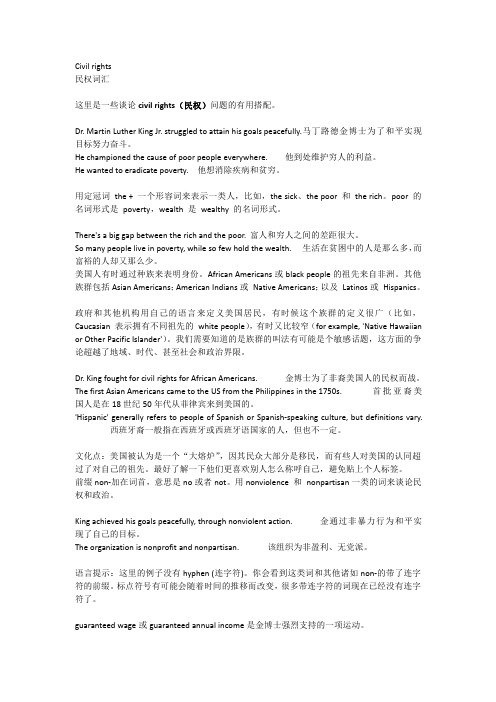
Civil rights民权词汇这里是一些谈论civil rights(民权)问题的有用搭配。
Dr.Martin Luther King Jr.struggled to attain his goals peacefully.马丁路德金博士为了和平实现目标努力奋斗。
He championed the cause of poor people everywhere.他到处维护穷人的利益。
He wanted to eradicate poverty.他想消除疾病和贫穷。
用定冠词the+一个形容词来表示一类人,比如,the sick、the poor和the rich。
poor的名词形式是poverty,wealth是wealthy的名词形式。
There's a big gap between the rich and the poor.富人和穷人之间的差距很大。
So many people live in poverty,while so few hold the wealth.生活在贫困中的人是那么多,而富裕的人却又那么少。
美国人有时通过种族来表明身份。
African Americans或black people的祖先来自非洲。
其他族群包括Asian Americans;American Indians或Native Americans;以及Latinos或Hispanics。
政府和其他机构用自己的语言来定义美国居民,有时候这个族群的定义很广(比如,Caucasian表示拥有不同祖先的white people),有时又比较窄(for example,'Native Hawaiian or Other Pacific Islander')。
我们需要知道的是族群的叫法有可能是个敏感话题,这方面的争论超越了地域、时代、甚至社会和政治界限。
Dr.King fought for civil rights for African Americans.金博士为了非裔美国人的民权而战。
各个学科名字的英文单词

各个学科名字的英文单词各个学科名字的英文单词每一门学科的名字都有属于它的英文单词,为此店铺为大家带来各个学科名字的英文单词。
学科名的英文单词Chinese 语文English 英语Japanese 日语history 历史mathematics 数学physical education 体育algebra 代数geometry 几何geography 地理biology 生物chemistry 化学physics 物理literature 文学psychology 心理学sociology 社会学philosophy 哲学engineering 工程学mechanical engineering 机械工程学electronics 电子学medicine 医学social science 社会学agriculture 农学astronomy 天文学economics 经济学politics 政治学biochemistry 生物化学anthropology 人类学linguistics 语言学accounting 会计学law 法学metallurgy 冶金学finance 财政学,金融学journalism 新闻学civil engineering 土木工程学architecture 建筑学business administration 工商管理学chemical engineering 化学工程学botany 植物学学科的英文例句计算机科学目前已是一门成熟的.学科。
Computer science is now a fully-fledged academic subject.他熟悉这一学科。
He is at home with this subject.她已全面掌握了这一学科。
She has a comprehensive grasp of the subject.但愿我能精通这门学科就好了。
政治学专业英语教程pdf
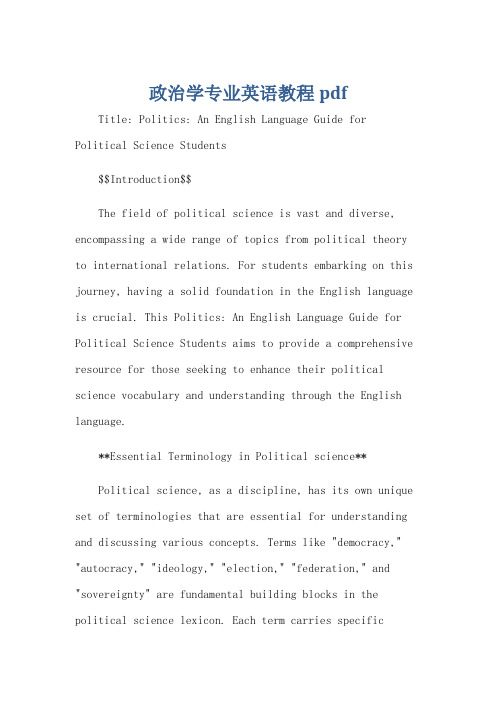
政治学专业英语教程pdfTitle: Politics: An English Language Guide forPolitical Science Students$$Introduction$$The field of political science is vast and diverse, encompassing a wide range of topics from political theory to international relations. For students embarking on this journey, having a solid foundation in the English language is crucial. This Politics: An English Language Guide for Political Science Students aims to provide a comprehensive resource for those seeking to enhance their political science vocabulary and understanding through the English language.**Essential Terminology in Political science**Political science, as a discipline, has its own unique set of terminologies that are essential for understanding and discussing various concepts. Terms like "democracy," "autocracy," "ideology," "election," "federation," and "sovereignty" are fundamental building blocks in the political science lexicon. Each term carries specificmeanings and nuances that are critical for accurate communication and analysis.**Reading Comprehension in Political Texts**Reading comprehension is a cornerstone skill inpolitical science. Political texts, whether they are academic articles, political manifestos, or legal documents, often contain dense and complex language. To effectively navigate these texts, students need to develop strong reading comprehension skills. This includes the ability to identify key arguments, understand complex sentences, and interpret implicit meanings.**Writing Skills for Political Analysis**Writing is an integral part of political science, as it allows students to articulate their ideas, analyzepolitical events, and formulate arguments. To excel in political writing, students should master the basics of essay writing, including structuring arguments, using evidence to support claims, and employing clear and concise language. Additionally, they should familiarize themselves with the conventions of academic writing, such as citing sources and adhering to formatting guidelines.**Listening and Speaking Skills in Political Discussions**In the realm of political science, listening and speaking skills are paramount. Political discussions often involve diverse viewpoints and lively debates. To participate effectively in these discussions, students must be able to listen attentively, understand different perspectives, and articulate their own opinions clearly and coherently. They should also develop the ability to engage in critical discussions, asking probing questions and offering well-reasoned responses.**Cultural Sensitivity and Cross-Cultural Communication**Political science is a global discipline that often intersects with different cultures and contexts. Therefore, cultural sensitivity and cross-cultural communicationskills are essential for political science students. Understanding the political systems, values, and traditions of other cultures allows for a more nuanced and informed analysis of political events and phenomena. Additionally, being able to communicate effectively with people fromdiverse backgrounds is crucial in international relations and global politics.**Conclusion**In conclusion, this Politics: An English Language Guide for Political Science Students provides a comprehensive overview of the essential English language skills required for studying political science. By enhancing their vocabulary, reading comprehension, writing skills,listening and speaking abilities, and cultural sensitivity, students will be well-prepared to navigate the complexities of the political science landscape. As they continue to develop their understanding and expertise in this fascinating field, they will be able to contribute to informed discussions and analysis of political issues both locally and globally.This guide serves as a starting point for political science students who want to strengthen their English language proficiency. However, it is important to note that language learning is a continuous process, and students should continue to explore and practice various language skills throughout their academic journey. With dedicationand effort, they will be able to master the English language and excel in the field of political science.。
Politics and the English Language政治与英语
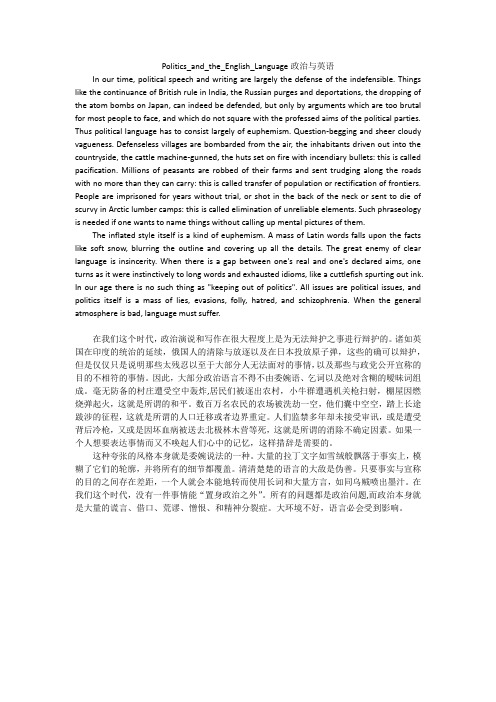
Politics_and_the_English_Language政治与英语In our time, political speech and writing are largely the defense of the indefensible. Things like the continuance of British rule in India, the Russian purges and deportations, the dropping of the atom bombs on Japan, can indeed be defended, but only by arguments which are too brutal for most people to face, and which do not square with the professed aims of the political parties. Thus political language has to consist largely of euphemism. Question-begging and sheer cloudy vagueness. Defenseless villages are bombarded from the air, the inhabitants driven out into the countryside, the cattle machine-gunned, the huts set on fire with incendiary bullets: this is called pacification. Millions of peasants are robbed of their farms and sent trudging along the roads with no more than they can carry: this is called transfer of population or rectification of frontiers. People are imprisoned for years without trial, or shot in the back of the neck or sent to die of scurvy in Arctic lumber camps: this is called elimination of unreliable elements. Such phraseology is needed if one wants to name things without calling up mental pictures of them.The inflated style itself is a kind of euphemism. A mass of Latin words falls upon the facts like soft snow, blurring the outline and covering up all the details. The great enemy of clear language is insincerity. When there is a gap between one's real and one's declared aims, one turns as it were instinctively to long words and exhausted idioms, like a cuttlefish spurting out ink. In our age there is no such thing as "keeping out of politics". All issues are political issues, and politics itself is a mass of lies, evasions, folly, hatred, and schizophrenia. When the general atmosphere is bad, language must suffer.在我们这个时代,政治演说和写作在很大程度上是为无法辩护之事进行辩护的。
Unit 4 Politics_ Class and Race (英国的政治_阶级和种族)
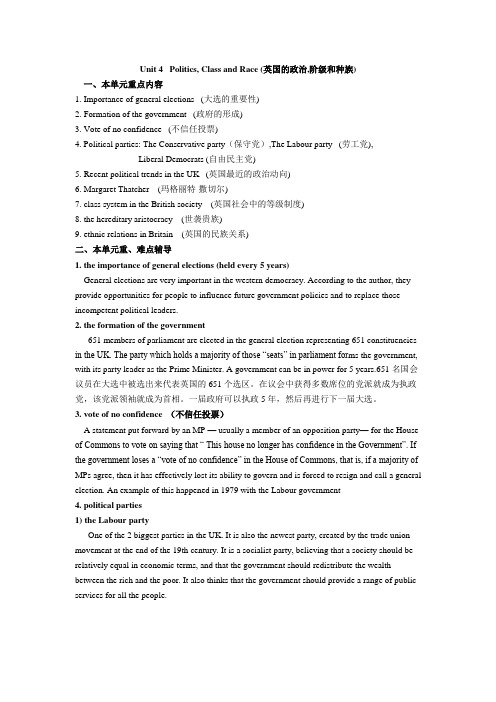
Unit 4 Politics, Class and Race (英国的政治,阶级和种族)一、本单元重点内容1. Importance of general elections (大选的重要性)2. Formation of the government (政府的形成)3. Vote of no confidence (不信任投票)4. Political parties: The Conservative party(保守党),The Labour party (劳工党),Liberal Democrats (自由民主党)5. Recent political trends in the UK (英国最近的政治动向)6. Margaret Thatcher (玛格丽特·撒切尔)7. class system in the British society (英国社会中的等级制度)8. the hereditary aristocracy (世袭贵族)9. ethnic relations in Britain (英国的民族关系)二、本单元重、难点辅导1. the importance of general elections (held every 5 years)General elections are very important in the western democracy. According to the author, they provide opportunities for people to influence future government policies and to replace those incompetent political leaders.2. the formation of the government651 members of parliament are elected in the general election representing 651 constituencies in the UK. The party which holds a majority of those “seats” in parliament for ms the government, with its party leader as the Prime Minister. A government can be in power for 5 years.651名国会议员在大选中被选出来代表英国的651个选区。
关于高中语文、数学、英语、历史、地理和政治六门学科的语录
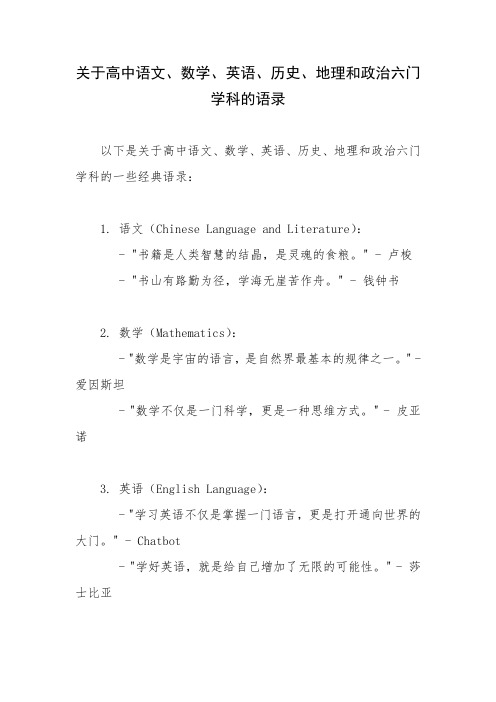
关于高中语文、数学、英语、历史、地理和政治六门学科的语录以下是关于高中语文、数学、英语、历史、地理和政治六门学科的一些经典语录:1. 语文(Chinese Language and Literature):- "书籍是人类智慧的结晶,是灵魂的食粮。
" - 卢梭- "书山有路勤为径,学海无崖苦作舟。
" - 钱钟书2. 数学(Mathematics):- "数学是宇宙的语言,是自然界最基本的规律之一。
" - 爱因斯坦- "数学不仅是一门科学,更是一种思维方式。
" - 皮亚诺3. 英语(English Language):- "学习英语不仅是掌握一门语言,更是打开通向世界的大门。
" - Chatbot- "学好英语,就是给自己增加了无限的可能性。
" - 莎士比亚4. 历史(History):- "研究历史可以让我们更好地认识过去,从而更好地理解现在和未来。
" - 爱德华·吉本- "历史是人类的镜子,通过研究历史,我们能看到自己的影子。
" - 雷锋5. 地理(Geography):- "地理是研究地球和人类在地球上分布、相互关系的科学。
" - Chatbot- "地理告诉我们不同地区的环境、资源和文化,帮助我们更好地了解世界。
" - 弗兰西斯·培根6. 政治(Politics):- "政治影响着每个人的生活,参与政治可以改变世界。
" - 尼尔斯·玻尔- "政治不仅仅是权力和斗争,也是为了实现社会正义和共同利益。
" - 马丁·路德·金这些语录试图概括每门学科的重要性和意义,鼓励对学习和探索的热情。
希望它们能够激励你在学习过程中取得成功!。
国际政治专业英语要求
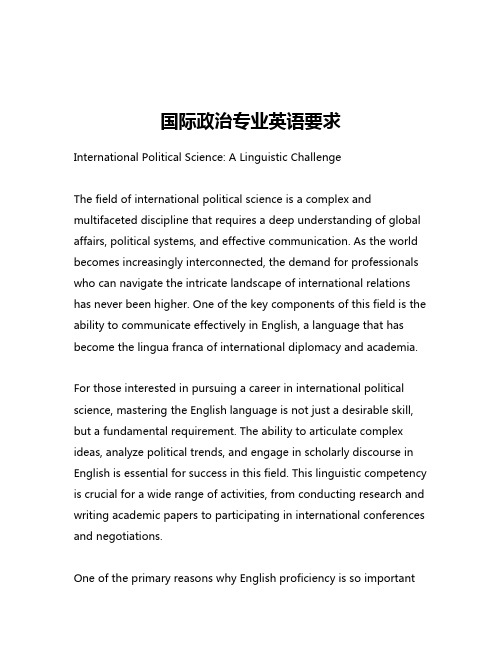
国际政治专业英语要求International Political Science: A Linguistic ChallengeThe field of international political science is a complex and multifaceted discipline that requires a deep understanding of global affairs, political systems, and effective communication. As the world becomes increasingly interconnected, the demand for professionals who can navigate the intricate landscape of international relations has never been higher. One of the key components of this field is the ability to communicate effectively in English, a language that has become the lingua franca of international diplomacy and academia.For those interested in pursuing a career in international political science, mastering the English language is not just a desirable skill, but a fundamental requirement. The ability to articulate complex ideas, analyze political trends, and engage in scholarly discourse in English is essential for success in this field. This linguistic competency is crucial for a wide range of activities, from conducting research and writing academic papers to participating in international conferences and negotiations.One of the primary reasons why English proficiency is so importantin international political science is the global nature of the field. Political events and decisions made in one part of the world can have far-reaching consequences on a global scale. Effective communication in English allows scholars, policymakers, and diplomats to share ideas, exchange information, and collaborate on solutions to pressing international issues. Without a common language, the exchange of knowledge and the coordination of global efforts would be significantly hindered.Moreover, the language of international political science is often highly specialized, incorporating technical terms, acronyms, and concepts that are specific to the field. Mastering this specialized vocabulary and the ability to use it accurately and fluently is crucial for academics and professionals in the field. Whether it's discussing the nuances of international organizations, analyzing geopolitical strategies, or debating the merits of different economic policies, the ability to communicate effectively in English is essential.In addition to the practical necessity of English proficiency, the study of international political science also requires a deep understanding of cultural and linguistic diversity. Effective international cooperation and diplomacy often hinge on the ability to navigate and respect different cultural norms, social customs, and communication styles. By developing a strong command of the English language, students and professionals in this field can better understand and engage withindividuals and institutions from around the world, fostering a more inclusive and effective global dialogue.Furthermore, the pursuit of international political science often involves extensive research, analysis, and academic writing. The ability to read, comprehend, and critically evaluate a wide range of English-language sources, from journal articles to government reports, is crucial for building a solid foundation of knowledge and contributing to the scholarly discourse in the field. Equally important is the ability to present research findings and ideas clearly and persuasively in written English, whether in the form of research papers, policy briefs, or academic publications.In conclusion, the requirement for English proficiency in the field of international political science is a reflection of the global nature of the discipline and the need for effective communication across borders. By developing a strong command of the English language, students and professionals in this field can enhance their ability to participate in the global exchange of ideas, collaborate on international initiatives, and contribute to the advancement of knowledge and understanding in this dynamic and ever-evolving field.。
politics and the english language学习任务答案与篇章讲解赏析
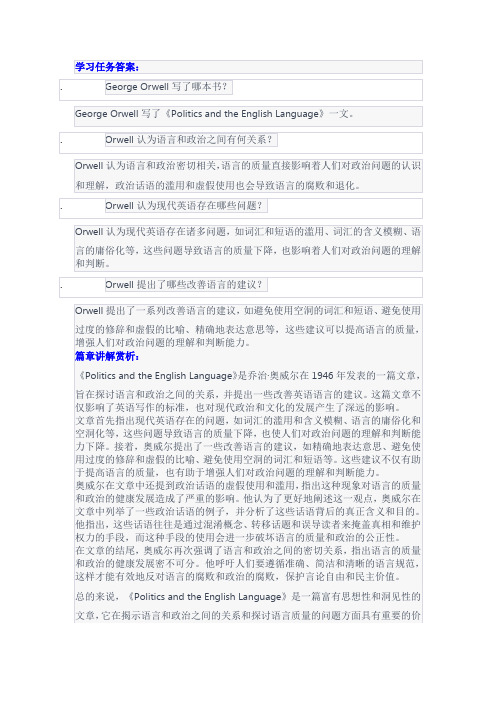
.
Orwell 认为现代英语存在哪些问题?
Orwell 认为现代英语存在诸多问题,如词汇和短语的滥用、词汇的含义模糊、语
言的庸俗化等,这些问题导致语言的质量下降,也影响着人们对政治问题的理解 和判断。
.
ห้องสมุดไป่ตู้
Orwell 提出了哪些改善语言的建议?
Orwell 提出了一系列改善语言的建议,如避免使用空洞的词汇和短语、避免使用
学习任务答案:
.
George Orwell 写了哪本书?
George Orwell 写了《Politics and the English Language》一文。
.
Orwell 认为语言和政治之间有何关系?
Orwell 认为语言和政治密切相关,语言的质量直接影响着人们对政治问题的认识 和理解,政治话语的滥用和虚假使用也会导致语言的腐败和退化。
总的来说,《Politics and the English Language》是一篇富有思想性和洞见性的
文章,它在揭示语言和政治之间的关系和探讨语言质量的问题方面具有重要的价
值。它不仅是一篇关于英语写作的经典之作,也是一篇关于政治文化的经典之作, 它的影响不仅限于英语世界,也深刻地影响了世界各地的文化和政治发展。
过度的修辞和虚假的比喻、精确地表达意思等,这些建议可以提高语言的质量, 增强人们对政治问题的理解和判断能力。 篇章讲解赏析:
《Politics and the English Language》是乔治·奥威尔在 1946 年发表的一篇文章,
旨在探讨语言和政治之间的关系,并提出一些改善英语语言的建议。这篇文章不 仅影响了英语写作的标准,也对现代政治和文化的发展产生了深远的影响。 文章首先指出现代英语存在的问题,如词汇的滥用和含义模糊、语言的庸俗化和 空洞化等,这些问题导致语言的质量下降,也使人们对政治问题的理解和判断能 力下降。接着,奥威尔提出了一些改善语言的建议,如精确地表达意思、避免使 用过度的修辞和虚假的比喻、避免使用空洞的词汇和短语等。这些建议不仅有助 于提高语言的质量,也有助于增强人们对政治问题的理解和判断能力。 奥威尔在文章中还提到政治话语的虚假使用和滥用,指出这种现象对语言的质量 和政治的健康发展造成了严重的影响。他认为了更好地阐述这一观点,奥威尔在 文章中列举了一些政治话语的例子,并分析了这些话语背后的真正含义和目的。 他指出,这些话语往往是通过混淆概念、转移话题和误导读者来掩盖真相和维护 权力的手段,而这种手段的使用会进一步破坏语言的质量和政治的公正性。 在文章的结尾,奥威尔再次强调了语言和政治之间的密切关系,指出语言的质量 和政治的健康发展密不可分。他呼吁人们要遵循准确、简洁和清晰的语言规范, 这样才能有效地反对语言的腐败和政治的腐败,保护言论自由和民主价值。
- 1、下载文档前请自行甄别文档内容的完整性,平台不提供额外的编辑、内容补充、找答案等附加服务。
- 2、"仅部分预览"的文档,不可在线预览部分如存在完整性等问题,可反馈申请退款(可完整预览的文档不适用该条件!)。
- 3、如文档侵犯您的权益,请联系客服反馈,我们会尽快为您处理(人工客服工作时间:9:00-18:30)。
George OrwellPolitics and the English LanguageMost people who bother with the matter at all would admit that the English language is in a bad way, but it is generally assumed that we cannot by conscious action do anything about it. Our civilization is decadent and our language — so the argument runs — must inevitably share in the general collapse. It follows that any struggle against the abuse of language is a sentimental archaism, like preferring candles to electric light or hansom cabs to aeroplanes. Underneath this lies thehalf-conscious belief that language is a natural growth and not an instrument which we shape for our own purposes.Now, it is clear that the decline of a language must ultimately have political and economic causes: it is not due simply to the bad influence of this or that individual writer. But an effect can become a cause, reinforcing the original cause and producing the same effect in an intensified form, and so on indefinitely. A man may take to drink because he feels himself to be a failure, and then fail all the more completely because he drinks. It is rather the same thing that is happening to the English language. It becomes ugly and inaccurate because our thoughts are foolish, but the slovenliness of our language makes it easier for us to have foolish thoughts. The point is that the process is reversible. Modern English, especially written English, is full of bad habits which spread by imitation and which can be avoided if one is willing to take the necessary trouble. If one gets rid of these habits one can think more clearly, and to think clearly is a necessary first step toward political regeneration: so that the fight against bad English is not frivolous and is not the exclusive concern of professional writers. I will come back to this presently, and I hope that by that time the meaning of what I have said here will have become clearer. Meanwhile, here are five specimens of the English language as it is now habitually written.These five passages have not been picked out because they are especially bad — I could have quoted far worse if I had chosen — but because they illustrate various of the mental vices from which we now suffer. They are a little below the average, but are fairly representative examples. I number them so that I can refer back to them when necessary:1. I am not, indeed, sure whether it is not true to say that the Milton who once seemed not unlike a seventeenth-century Shelley had not become,out of an experience ever more bitter in each year, more alien [sic] to the founder of that Jesuit sect which nothing could induce him to tolerate.Professor Harold Laski (Essay in Freedom of Expression)2. Above all, we cannot play ducks and drakes with a native battery of idioms which prescribes egregious collocations of vocables as the Basic put up with for tolerate, or put at a loss for bewilder.Professor Lancelot Hogben (Interglossia)3. On the one side we have the free personality: by definition it is not neurotic, for it has neither conflict nor dream. Its desires, such as they are, are transparent, for they are just what institutional approval keeps in the forefront of consciousness; another institutional pattern would alter their number and intensity; there is little in them that is natural, irreducible, or culturally dangerous. But on the other side, the social bond itself is nothing but the mutual reflection of these self-secure integrities. Recall the definition of love. Is not this the very picture of a small academic? Where is there a place in this hall of mirrors for either personality or fraternity?Essay on psychology in Politics (New York)4. All the ‘best people’ from the gentlemen's clubs, and all the frantic fascist captains, united in common hatred of Socialism and bestial horror at the rising tide of the mass revolutionary movement, have turned to acts of provocation, to foul incendiarism, to medieval legends of poisoned wells, to legalize their own destruction of proletarian organizations, and rouse the agitated petty-bourgeoise to chauvinistic fervor on behalf of the fight against the revolutionary way out of the crisis.Communist pamphlet5. If a new spirit is to be infused into this old country, there is one thorny and contentious reform which must be tackled, and that is the humanization and galvanization of the B.B.C. Timidity here will bespeak canker and atrophy of the soul. The heart of Britain may be sound and of strong beat, for instance, but the British lion's roar at present is like that of Bottom in Shakespeare's A Midsummer Night's Dream— as gentle as any sucking dove. A virile new Britain cannot continue indefinitely to be traduced in the eyes or rather ears, of the world by the effete languors of Langham Place, brazenly masquerading as ‘standard English’. When the Voice of Britain is heard at nine o'clock, better far and infinitely less ludicrous to hear aitches honestly dropped than thepresent priggish, inflated, inhibited, school-ma'amish arch braying of blameless bashful mewing maidens!Letter in TribuneEach of these passages has faults of its own, but, quite apart from avoidable ugliness, two qualities are common to all of them. The first is staleness of imagery; the other is lack of precision. The writer either has a meaning and cannot express it, or he inadvertently says something else, or he is almost indifferent as to whether his words mean anything or not. This mixture of vagueness and sheer incompetence is the most marked characteristic of modern English prose, and especially of any kind of political writing. As soon as certain topics are raised, the concrete melts into the abstract and no one seems able to think of turns of speech that are not hackneyed: prose consists less and less of words chosen for the sake of their meaning, and more and more of phrases tacked together like the sections of a prefabricated hen-house. I list below, with notes and examples, various of the tricks by means of which the work of prose-construction is habitually dodged.DYING METAPHORS. A newly invented metaphor assists thought by evoking a visual image, while on the other hand a metaphor which is technically ‘dead’ (e. g. iron resolution) has in effect reverted to being an ordinary word and can generally be used without loss of vividness. But in between these two classes there is a huge dump of worn-out metaphors which have lost all evocative power and are merely used because they save people the trouble of inventing phrases for themselves. Examples are: Ring the changes on, take up the cudgel for, toe the line, ride roughshod over, stand shoulder to shoulder with, play into the hands of, no axe to grind, grist to the mill, fishing in troubled waters, on the order of the day, Achilles’ heel, swan song, hotbed. Many of these are used without knowledge of their meaning (what is a ‘rift’, for instance?), and incompatible metaphors are frequently mixed, a sure sign that the writer is not interested in what he is saying. Some metaphors now current have been twisted out of their original meaning without those who use them even being aware of the fact. For example, toe the line is sometimes written as tow the line. Another example is the hammer and the anvil, now always used with the implication that the anvil gets the worst of it. In real life it is always the anvil that breaks the hammer, never the other way about: a writer who stopped to think what he was saying would avoid perverting the original phrase.OPERATORS OR VERBAL FALSE LIMBS. These save the trouble of picking out appropriate verbs and nouns, and at the same time pad each sentence with extra syllables which give it an appearance of symmetry. Characteristicphrases are render inoperative, militate against, make contact with, be subjected to, give rise to, give grounds for, have the effect of, play a leading part (role) in, make itself felt, take effect, exhibit a tendency to, serve the purpose of, etc., etc. The keynote is the elimination of simple verbs. Instead of being a single word, such as break, stop, spoil, mend, kill,a verb becomes a phrase, made up of a noun or adjective tacked on to some general-purpose verb such as prove, serve, form, play, render. In addition, the passive voice is wherever possible used in preference to the active, and noun constructions are used instead of gerunds (by examination of instead of by examining). The range of verbs is further cut down by means of the -ize and de-formations, and the banal statements are given an appearance of profundity by means of the not un- formation. Simple conjunctions and prepositions are replaced by such phrases as with respect to, having regard to, the fact that, by dint of, in view of, in the interests of, on the hypothesis that; and the ends of sentences are saved by anticlimax by such resounding commonplaces as greatly to be desired, cannot be left out of account, a development to be expected in the near future, deserving of serious consideration, brought to a satisfactory conclusion, and so on and so forth.PRETENTIOUS DICTION. Words like phenomenon, element, individual (as noun), objective, categorical, effective, virtual, basic, primary, promote, constitute, exhibit, exploit, utilize, eliminate, liquidate,are used to dress up a simple statement and give an air of scientific impartiality to biased judgements. Adjectives like epoch-making, epic, historic, unforgettable, triumphant, age-old, inevitable, inexorable, veritable, are used to dignify the sordid process of international politics, while writing that aims at glorifying war usually takes on an archaic colour, its characteristic words being: realm, throne, chariot, mailed fist, trident, sword, shield, buckler, banner, jackboot, clarion.Foreign words and expressions such as cul de sac, ancien regime, deus ex machina, mutatis mutandis, status quo, gleichschaltung, weltanschauung, are used to give an air of culture and elegance. Except for the useful abbreviations i.e., e. g. and etc.,there is no real need for any of the hundreds of foreign phrases now current in the English language. Bad writers, and especially scientific, political, and sociological writers, are nearly always haunted by the notion that Latin or Greek words are grander than Saxon ones, and unnecessary words like expedite, ameliorate, predict, extraneous, deracinated, clandestine, subaqueous,and hundreds of others constantly gain ground from their Anglo-Saxon numbers(1). The jargon peculiar to Marxist writing (hyena, hangman, cannibal, petty bourgeois, these gentry, lackey, flunkey, mad dog, White Guard, etc.) consists largely of words translated from Russian, German, or French; but the normal way of coining a new word is to use Latin or Greek root with theappropriate affix and, where necessary, the size formation. It is often easier to make up words of this kind (deregionalize, impermissible, extramarital, non-fragmentary and so forth) than to think up the English words that will cover one's meaning. The result, in general, is an increase in slovenliness and vagueness.MEANINGLESS WORDS. In certain kinds of writing, particularly in art criticism and literary criticism, it is normal to come across long passages which are almost completely lacking in meaning(2). Words like romantic, plastic, values, human, dead, sentimental, natural, vitality, as used in art criticism, are strictly meaningless, in the sense that they not only do not point to any discoverable object, but are hardly ever expected to do so by the reader. When one critic wri tes, ‘The outstanding feature of Mr. X's work is its living quality’, while another writes, ‘The immediately striking thing about Mr. X's work is its peculiar deadness’, the reader accepts this as a simple difference opinion. If words like black and white were involved, instead of the jargon words dead and living, he would see at once that language was being used in an improper way. Many political words are similarly abused. The word Fascism has now no meaning except in so far as it signifies ‘something not desirable’. The words democracy, socialism, freedom, patriotic, realistic, justice have each of them several different meanings which cannot be reconciled with one another. In the case of a word like democracy, not only is there no agreed definition, but the attempt to make one is resisted from all sides. It is almost universally felt that when we call a country democratic we are praising it: consequently the defenders of every kind of regime claim that it is a democracy, and fear that they might have to stop using that word if it were tied down to any one meaning. Words of this kind are often used in a consciously dishonest way. That is, the person who uses them has his own private definition, but allows his hearer to think he means something quite different. Statements like Marshal Petain was a true patriot, The Soviet press is the freest in the world, The Catholic Church is opposed to persecution,are almost always made with intent to deceive. Other words used in variable meanings, in most cases more or less dishonestly, are: class, totalitarian, science, progressive, reactionary, bourgeois, equality.Now that I have made this catalogue of swindles and perversions, let me give another example of the kind of writing that they lead to. This time it must of its nature be an imaginary one. I am going to translate a passage of good English into modern English of the worst sort. Here is a well-known verse from Ecclesiastes:I returned and saw under the sun, that the race is not to the swift, nor the battle to the strong, neither yet bread to the wise, nor yet richesto men of understanding, nor yet favour to men of skill; but time and chance happeneth to them all.Here it is in modern English:Objective considerations of contemporary phenomena compel the conclusion that success or failure in competitive activities exhibits no tendency to be commensurate with innate capacity, but that a considerable element of the unpredictable must invariably be taken into account.This is a parody, but not a very gross one.。
